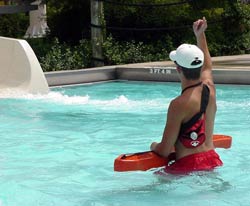
Is Your Aquatics Safety Program Up to Date?
Beaches, swimming pools and water parks are some of the most enticing offerings PDRMA members provide to patrons in the summer. They are also areas of mass assembly and some of the greatest liability exposures. And now, the U.S. Department of Homeland Security has begun raising awareness about security and emergency planning procedures at aquatic facilities, should violence erupt.
 “PDRMA has always provided members with training opportunities and resources to address the aquatic environment, and we’re continuing to do the same even as the risks we face are changing,” explains Bill Hooker, PDRMA Training Programs Supervisor. “PDRMA has always provided members with training opportunities and resources to address the aquatic environment, and we’re continuing to do the same even as the risks we face are changing,” explains Bill Hooker, PDRMA Training Programs Supervisor.
To stay ahead of the curve, PDRMA presented a half-day class on April 5 at Northern Illinois University in Naperville addressing Security and Emergency Planning for the Modern-day Aquatic Facility.
Paul Timm, a board certified Physical Security Professional, guided members through a proactive look at emerging threats in the aquatic environment. Timm outlined PDRMA's best practices for updating and implementing security and emergency plans to address these modern-day threats to safety.
 A quick look at today's headlines shows many communities faced with violence leading to mass casualties and/or criminal acts against children. The class clarified the nature of such threats and stressed the importance of planning — especially conducting security assessments, having written plans and offering training and drills for experienced, new and seasonal employees. Timm reviewed facility lockdown procedures, crowd control and law enforcement coordination, with special emphasis on extreme scenarios like active shooter or assailant situations and missing child/Code Adam alerts. A quick look at today's headlines shows many communities faced with violence leading to mass casualties and/or criminal acts against children. The class clarified the nature of such threats and stressed the importance of planning — especially conducting security assessments, having written plans and offering training and drills for experienced, new and seasonal employees. Timm reviewed facility lockdown procedures, crowd control and law enforcement coordination, with special emphasis on extreme scenarios like active shooter or assailant situations and missing child/Code Adam alerts.
PDRMA also offered its Essential Elements aquatic webinar in March, which reviewed 2017 aquatic-related incidents and claims, updated members on PDRMA’s aquatic audit programs and reviewed the lifeguard vision screening program and other risk management and training resources. If you were unable to attend, please click here to listen to the webinar recording.
For easy access to the resources you need most this aquatic season, click here to read PDRMA’s 2018 Aquatics Season: Are You Ready? to be sure you are. |

